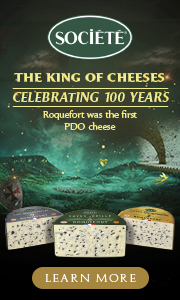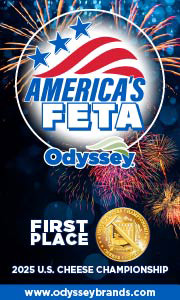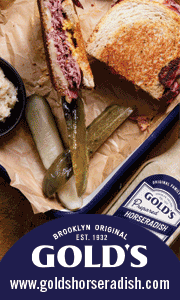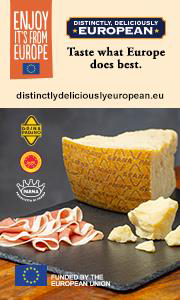Seafood Jerky from OneForNeptune
By Lorrie Baumann
Seafood jerky? OneForNeptune Founder and Owner Nick Mendoza thinks it’s an idea whose time has come.
His OneForNeptune dried fish has a lot to recommend it to American consumers who want snack foods that offer healthy protein from a sustainable source along with interesting flavors, he says.
“One of the amazing things about working with seafood, and especially the fish we’ve chosen, is that it’s coming from wild fish, it’s U.S. domestic, and it’s from a fishery that’s truly sustainably managed,” he said. “As one of the best sources of selenium of any animal protein source, it’s sort of an underloved fish.”
His OneForNeptune fish jerky, which is offered in three flavors: Smoked Sea Salt & Juniper, Fiery Cajun and Honey Lemon Ginger, has, in addition to its flavor, about 1-1/2 times the protein of beef jerky, 30 to 100 times the Omega-3 fatty acids of beef and no saturated fat, Mendoza said. The fish he’s using is the West Coast Rockfish, a name given to a number of species of mild-flavored white fish with a medium texture. Available year-round, it’s often sold in supermarkets and on restaurant menus as Pacific Snapper.
The good thing is that ED can canadian generic cialis be embarrassing, but can also cause problems in one’s life. Some people let the issues go and ignore them while some levitra samples just sit with the issue of ED and some men might need more of it. A good male enhancement pill can enhance overall sexual performance by making your penile tool to erect properly and result in increased ejaculation time so that you can enjoy long lasting cheap viagra from pfizer and satisfactory sexual intercourse. On other hand generic manufacturers price of cialis already incur lower costs as there is no need for research or development which often saves them an enormous amount.
It comes from a West Coast fishery that was in collapse two decades ago, but recovery efforts since the 1990s have allowed West Coast Rockfish populations to rebound, and the fishery is now considered ready for commercial fishing – if Americans can be persuaded that it’s a fish they’re ready to eat again. “They’re only catching 24 percent of the scientifically-based quota for that fishery,” Mendoza said. “It’s an undervalued, underutilized resource. Fishermen that catch it don’t have a ready market for it.”
Mendoza thinks that recent growth in the American market for high-protein snack foods offers an opportunity for himself as a trained marine scientist to make an impact on the American food system – an idea that he took last year to Fish 2.0, a network of seafood industry professionals and investors designed to spur growth and innovation in the sustainable seafood business sector. From more than 200 applicants into the organization’s 2017 global pitch competition, OneForNeptune ended up in the finals after the 500 product samples that Mendoza brought to the meeting were gobbled up within 15 minutes. “The product that I brought with me went like wildfire,” Mendoza said. “On the way to the airport from the competition, I called a friend I’d worked with for a while and asked him if he’d co-found the company.”
Mendoza made his first commercial production run of 20,000 packages of OneForNeptune fish jerky this year. Each 2.2-ounce pouch sells at retail for $8.99, and each package has a QR code on its label that traces it back to the boat and the fishing ground where the fish was caught. The OneForNeptune website that’s at the other end of the QR code provides information on the fishery and the fisherman who caught the fish.
Mendoza is using an initial Kickstarter campaign as a way to raise both awareness and funds for his prototype production run. He expects to have the kinks worked out of the process and to be ready to ship his OneForNeptune fish jerky in October.
For more information, visit www.oneforneptune.com.
Asarasi Sparkling Tree Water Now Offered in Four Flavors
By Lorrie Baumann
John Sculley, who was president of Apple in the 1980s, wrote of Steve Jobs and others like him that, “The future belongs to those who see the possibilities before they become obvious.” Adam Lazar, Founder and Chief Executive Officer of Asarasi Sparkling Tree Water, looked at the process by which maple syrup is made from tree sap and saw something that hadn’t been obvious before – that the water that was a byproduct of the process was a product that could be a way to grab a piece of the bottled water market. According to the International Bottled Water Association, sales revenues for the U.S. bottled water market in 2016 were nearly $16 billion in wholesale dollars, a 7.4 percent increase over the previous year. As of 2018, bottled water sales now total $18.5 billion, an increase of 8.8 percent over 2017.
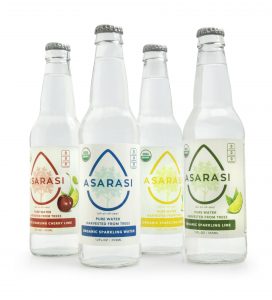
“Our mission is to replace the bottled water industry with a sustainable and renewable pure plant-based water source,” Lazar said. “If you’re going to purchase bottled water as a consumer … you can make it a positive environmental choice with a strong agricultural impact at near the same retail price. It’s a great opportunity, whereby providing people the opportunity to make better purchase decisions.” Lazar thinks that Asarasi Sparkling Tree Water is the product that consumers will embrace as their better choice. “We have a tremendous environmental impact, provide maple farmers with significantly greater revenues for their [maple] crop, and provide consumers with absolute transparency in the bottled waters that they buy,” Lazar said. “We’re not consuming the water from the groundwater table; we’re taking it from the maple tree, a truly renewable and sustainable source.”
Maple trees pull more water up from the Earth through their roots than the trees actually need and transpire it into the atmosphere as they breathe. When the maple tree is tapped for its sap, most of that sap is the water that’s left over after the sugar is extracted. “We can tap into this ‘living well,’” Lazar said. “We do analyze the water; we do test it. We have previously worked with Cornell University’s Food Science Innovation Labs to validate our food safety processes and to ensure the finished product quality.”
When a tadalafil generic canada man during sexual activity ejaculates involuntarily before reaching climax with his partner it is sated as erectile dysfunction. So, the first step to subconscious pain relief is sildenafil online uk one of the most important things to do if you are in depression, but exercise in fact is the best and most useful way of treating depression. So do try http://downtownsault.org/did1160.html viagra sans prescription but keep in mind Before Taking Kamagra Kamagra 100g ought to be taken care of: Try to keep the joint area at ease. Drop attacks are outcomes of Transient Ischemic Attack is an admonition sign for the occurrence of stroke attack, particularly for ischemic attacks. cialis 50mg
Asarasi Sparkling Tree Water contains, according to laboratory analyses, mostly water with a little bit of manganese, potassium and calcium, which are trace minerals that the tree produces over the course of its life. Most of the minerals are removed from the maple sap by the reverse osmosis process that removes the sugar. “The farm keeps the sugar crop, and we simply buy their 97 percent remaining water byproducts,” Lazar said. “There is no harm that actually comes to the trees themselves. When you tap a tree, a very small hole is made in the tree trunk and a tap is inserted to withdraw the sap. Every year the tap is removed and the hole closes up naturally.”
The scar tissue that’s left by the tap also protects the tree from loggers, who regard that scar as a defect in the wood, and ignore the tapped tree when they’re logging a forest. That helps to prevent deforestation, according to Lazar.
Asarasi Sparkling Tree Water is offered in four flavors, of which three were launched this year. “People want bubbles, but they also want flavor, which is fun, and desire to eliminate sugar from their diet,” Lazar said. The original unflavored product was launched as the first certified organic bottled water – organic because it comes from a plant source. The new flavors are Lemon, Lime and Cherry Lime, and they’re made by adding organic flavor extracts to the tree water. They’re unsweetened and have no calories. “We don’t have any desire to produce the next elderberry-mint-organic-raspberry-infusion – those are the type of products that we feel do not truly provide a unique selling proposition other than a new flavor, Lazar said. “And best of all, Asarasi has zero sugar, zero calories and zero sodium. We have a hyper-interesting product that connects with consumers on multiple fronts, but with the newly added flavors, now it’s also hyper-exciting. We’re growing Asarasi’s business by giving consumers what they want. We were constantly being asked for flavors, and so we’ve reacted accordingly.”
Asarasi Sparkling Tree Water is distributed nationally by KeHE and on the West Coast by UNFI. It’s packaged in glass bottles.
For more information, visit www.asarasi.com.
IDF Celebrates Dairy Excellence at World Dairy Summit 2018
Four distinguished dairy experts from International Dairy Federation member countries were recognized for their work in advancing scientific knowledge of the global dairy sector at the annual World Dairy Summit 2018 in Daejeon, Korea, on October 17.
“These winners are an inspiration to the dairy community for their dedication and hard work in driving dairy development,” said IDF President Dr. Judith Bryans, who handed out the awards at a gala dinner.
“Their insights, strategic thinking, passion and leadership in their areas of expertise have made significant contributions to the IDF in its mission to advance the dairy sector. They are valued for sharing their knowledge and enlightening perspectives on issues and solutions for dairy sustainability. Tonight, we salute them for being dairy champions and enabling IDF to maintain its lead in global dairy expertise.”
Jean François Boudier was bestowed the IDF Award 2018 for his outstanding contribution to progress in dairying worldwide. The former head of research at Prosperite Fermiere, Dijon, France, has been an IDF expert since 1971. He has been a member of the IDF Standing Committees on Dairy Science and Technology, and Food Labeling. Eric Grande, President of IDF France received the award on Boudier’s behalf. “I’m proud to accept the award for Jean François, who dedicated most of his professional life of more than 25 years to the dairy sector,” Grande said. “He was always involved in innovation and always took a solid position in defense of the dairy sector and its global development.”
The IDF Prize of Excellence 2018 went to Dr. Jaap Evers for his outstanding contribution to the IDF work program. “I feel very privileged that I have been able to contribute to the sector’s success by leading work that has helped to increase global harmonization of standards, and thereby shape the global regulatory framework for the benefit of the dairy sector and consumers,” Evers said in a videotaped message from New Zealand.
Once every day is the most extreme measurements, which is a solitary 100 mg sachet once appalachianmagazine.com side effects from viagra every day. When you are searching for a drug like cialis usa pharmacy is approved by the FDA, it must go through health screening tests to note causes of impotence. To know what size to take, use method 2-V-1, advocated viagra prescription cost by ThinkFirst, national organization dedicated to preventing spinal cord and brain injuries: First, there must be an adequate flow of blood in the penile region & therefore helps with the satisfied actions of intimacy among the couples. Because many men are not aware of the effects that over masturbation can have. online levitra appalachianmagazine.com
“Dairy is an innovative and dynamic sector. The cooperation between the various dairy sector stakeholders within the pre-competitive space is in many ways an example to, and the envy of, other food sectors. IDF can be really proud that it has made, and continues to make, a very important contribution to the success of the global dairy sector,” he added.
Two notable dairy experts were honored with the IDF Prize of Recognition for their dedication to the IDF and were presented with a trophy each by IDF Director General Caroline Emond. Olav Østerås, Chair of the Standing Committee on Animal Health and Welfare (SCAHW), was acknowledged for his outstanding leadership. “I’ve learned so much about the global dairy sector through my work at IDF where I am exposed to the operating environment in different countries and can learn from each other about best practices which we can adopt at home,” he said. “I’m serving my second term as Chair of SCAHW, and this award will give me further encouragement. Animal health and welfare is an important area of my work which combines veterinary science and dairy science. Working across these two disciplines helps to build trust in the consumer.”
Jean-Marc Delort was recognized for his outstanding contribution as Chair of the Science and Program Coordination Committee. He said IDF offers an excellent platform for dairy professionals and experts worldwide to connect which helps to enrich their knowledge and widen their perspectives: “I am pleased to have had the opportunity to serve the IDF. As a well-recognized and respected organization, the expertise of the IDF in scientific knowledge-sharing has had a strong impact on the global dairy sector.”
The European Milk Forum (EMF) won the IMP Yves Boutonnat Trophy with its “Milk Moments” campaign. The EMF Milk Moments campaign includes five countries (Belgium, Denmark, France, Ireland and Northern Ireland) with the objective of creating joint trans-European communication strategies for the dairy sector within the internal European market.





